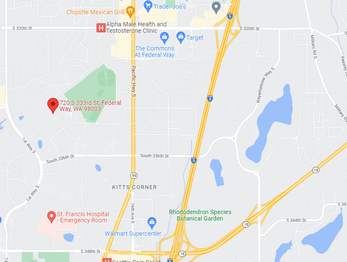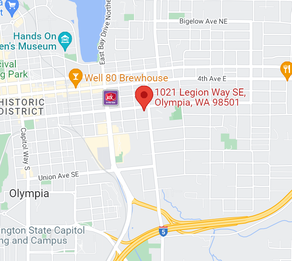 Photograph of Dr. Hartman.
Photograph of Dr. Hartman.
Headings:
Meet Dr. Hartman
Insurance & No Surprises Act
Contact Information
Office Locations
Dr. Hartman is committed to making her website accessible to everyone. The icon on the top right of the page can be used to change accessibility settings. The sections for the above headings can be reached by using the CTRL + F function on your keyboard. There are no linked pages or data tables presented. Please report any difficulties in accessing this website by calling 253-204-2700.
Meet Dr. Hartman
Insurance & No Surprises Act
Contact Information
Office Locations
Dr. Hartman is committed to making her website accessible to everyone. The icon on the top right of the page can be used to change accessibility settings. The sections for the above headings can be reached by using the CTRL + F function on your keyboard. There are no linked pages or data tables presented. Please report any difficulties in accessing this website by calling 253-204-2700.
Meet Dr. Hartman:
Lynne Hartman, Psy. D. (pronouns she, her, hers) is a Clinical Psychologist specializing in the assessment of neurodevelopmental disorders in school age children, adolescents, and young adults pursing higher education at colleges and universities. She also has experience in the assessment and treatment of emotional difficulties arising from trauma experiences and multiple separations from key attachment figures. Dr. Hartman's approach to assessment is informed by her understanding of the ways in which atypical development and early negative experiences interact to impact functioning at later stages.
Neurodevelopmental disabilities can interfere with gaining foundational skills for education as well as for rewarding relationships. Likewise, a history of trauma or neglect can lead to developmental delays with similar presentations. It can be difficult to accurately identify how each of these factors contribute to problems with learning and behavior based on subjective information, especially when multiple factors occur together. Psychological assessment supports treatment by identifying underlying issues based on an individual's strengths and weaknesses. When these issues are addressed with compassion and a clear understanding of how they impact self-regulation and learning, pathways for growth and healing can be identified.
Dr. Hartman attended Antioch University Seattle, where she studied neuropsychology and the neurobiology of attachment and trained in assessment with a board certified neuropsychologist . Dr. Hartman received additional training in the assessment and treatment of neurodevelopmental disabilities through the University of Washington's Leadership Education in Neurodevelopmental and Related Disabilities interdisciplinary program. Her clinical work has also included the assessment and treatment of trauma and neglect in foster and adoption populations.
Education:
Doctorate in Clinical Psychology from Antioch University Seattle with emphasis in Child and Family Systems.
Master of Arts in Counseling Psychology from Saint Martin's University.
University of Washington Leadership Education in Neurodevelopmental and Related Disabilities (UW LEND).
Attachment-Focused Therapy Certificate Program.
Adult Attachment Interview Training Institute (Reliability Certification).
Memberships:
American Psychological Association
Pacific Northwest Neuropsychological Society
Insurance & No Surprises Act:
Insurance companies may cover neuropsychological assessment to diagnose neurodevelopmental disorders, such as learning disabilities or ADHD. They also generally cover these services when related to a medical condition or to support treatment planning for a mental health diagnosis. These assessments generally address functioning across multiple environments, including both home and school. Pre-authorizations are recommended and often required for coverage. I am currently contracted with Regence and Premera. I am also happy to help with submission of your claim for out-of-network services; however, you will be responsible for any remaining balance. If you adopted your child through a state agency, therapy and/or neuropsychological assessment may be covered as part of your agreement.
On January 1, 2022, The Centers for Medicare and Medicaid put into effect The No Surprises Act, which requires providers to give a Good Faith Estimate of the total cost of nonemergency services. While I have always provided my best estimate of out-of-pocket costs for the families I serve, I am now required to present a notice of your rights. If I am not contracted by your insurance carrier, I will send a copy of this notice to you before we schedule your assessment. You may also ask for a printed copy of this notice to be sent by mail. The following notice has been supplied by the Washington State Insurance Commissioner to meet Washington as well as Federal requirements:
Your Rights and Protections Against
Surprise Medical Bills and Balance Billing
In Washington State
__________________________________________________________________________________________
When you get emergency care or get treated by an out-of-network provider at an in-network hospital or ambulatory surgical center, you are protected from surprise billing or balance billing.
What is “balance billing” (sometimes called “surprise billing”)?
You are protected from balance billing for:
Emergency Services
If you have an emergency medical condition, mental health or substance use disorder condition and
get emergency services from an out-of-network provider or facility, the most the provider or facility
may bill you is your plan’s in-network cost-sharing amount (such as copayments and coinsurance). You
can’t be balance billed for these emergency services. This includes care you receive in a hospital and in
facilities that provide crisis services to people experiencing a mental health or substance use disorder
emergency. You can’t be balance billed for these emergency services, including services you may get
after you’re in stable condition.
Certain services at an in-network hospital or ambulatory surgical center
When you get services from an in-network hospital or ambulatory surgical center, certain providers
there may be out-of-network. In these cases, the most these providers may bill you is your plan’s in-network
cost-sharing amount.
You also aren’t required to get care out-of-network. You can choose a provider or facility in your plan’s network.
When can you be asked to waive your protections from balance billing:
Health care providers, including hospitals and air ambulance providers, can never require you to give
up your protections from balance billing. If you have coverage through a self-funded group health plan, in some limited situations, a provider can ask you to consent to waive your balance billing protections, but you are never required to give your consent. Please contact your employer or health plan for more information.
When balance billing isn’t allowed, you also have the following protections:
If you believe you’ve been wrongly billed, you may file a complaint with the federal government at https://www.cms.gov/nosurprises/consumers or by calling 1-800-985-3059; and/or file a complaint with the Washington State Office of the Insurance Commissioner at their website or by calling 1-800-562-6900.
Visit https://www.cms.gov/nosurprises for more information about your rights under federal law.
Visit the Office of the Insurance Commissioner Balance Billing Protection Act website for more
information about your rights under Washington state law.
While the state may not entirely cover the cost of services, Adoption Support may cover a substantial portion for children who joined the family through domestic adoption. However, the state requires that you use any insurance benefit available before using state funds. In the past, Adoption Support has been available to assist with the deductible in high deductible plans. A pre-authorization is required. Please advise me if you are planning to utilize this coverage before the initial appointment.
Purely educational assessments are provided without charge at public schools. These assessments generally pertain only to the school environment. Parents may wish to have children evaluated outside the school system for a variety of reasons. The wait list at the school may be long, or they may want an independent assessment. Although I am happy to provide assessments purely for educational purposes, most insurance companies do not cover these services.
Contact Information:
Lynne Hartman, Psy.D.
Clinical Psychologist
Phone: 253-204-2700
Fax: 253-874-0459
Mailing Address:
PO Box 23633
Federal Way, WA 98093
Office Locations:
Compassionate Pathways Psychology Services, LLC is an independent practice and services are offered by appointment only. Telehealth is available for the initial interview and feedback sessions if your insurance plan covers it. Almost all testing is conducted in person. ADA accessible parking and restrooms are available at both locations.
Federal Way Location (Olympic Building):
720 South 333rd Street, Suite 212
Federal Way, WA 98003
Olympia Location :
1021 Legion Way SE
Olympia, WA 98501-1522
Lynne Hartman, Psy. D. (pronouns she, her, hers) is a Clinical Psychologist specializing in the assessment of neurodevelopmental disorders in school age children, adolescents, and young adults pursing higher education at colleges and universities. She also has experience in the assessment and treatment of emotional difficulties arising from trauma experiences and multiple separations from key attachment figures. Dr. Hartman's approach to assessment is informed by her understanding of the ways in which atypical development and early negative experiences interact to impact functioning at later stages.
Neurodevelopmental disabilities can interfere with gaining foundational skills for education as well as for rewarding relationships. Likewise, a history of trauma or neglect can lead to developmental delays with similar presentations. It can be difficult to accurately identify how each of these factors contribute to problems with learning and behavior based on subjective information, especially when multiple factors occur together. Psychological assessment supports treatment by identifying underlying issues based on an individual's strengths and weaknesses. When these issues are addressed with compassion and a clear understanding of how they impact self-regulation and learning, pathways for growth and healing can be identified.
Dr. Hartman attended Antioch University Seattle, where she studied neuropsychology and the neurobiology of attachment and trained in assessment with a board certified neuropsychologist . Dr. Hartman received additional training in the assessment and treatment of neurodevelopmental disabilities through the University of Washington's Leadership Education in Neurodevelopmental and Related Disabilities interdisciplinary program. Her clinical work has also included the assessment and treatment of trauma and neglect in foster and adoption populations.
Education:
Doctorate in Clinical Psychology from Antioch University Seattle with emphasis in Child and Family Systems.
Master of Arts in Counseling Psychology from Saint Martin's University.
University of Washington Leadership Education in Neurodevelopmental and Related Disabilities (UW LEND).
Attachment-Focused Therapy Certificate Program.
Adult Attachment Interview Training Institute (Reliability Certification).
Memberships:
American Psychological Association
Pacific Northwest Neuropsychological Society
Insurance & No Surprises Act:
Insurance companies may cover neuropsychological assessment to diagnose neurodevelopmental disorders, such as learning disabilities or ADHD. They also generally cover these services when related to a medical condition or to support treatment planning for a mental health diagnosis. These assessments generally address functioning across multiple environments, including both home and school. Pre-authorizations are recommended and often required for coverage. I am currently contracted with Regence and Premera. I am also happy to help with submission of your claim for out-of-network services; however, you will be responsible for any remaining balance. If you adopted your child through a state agency, therapy and/or neuropsychological assessment may be covered as part of your agreement.
On January 1, 2022, The Centers for Medicare and Medicaid put into effect The No Surprises Act, which requires providers to give a Good Faith Estimate of the total cost of nonemergency services. While I have always provided my best estimate of out-of-pocket costs for the families I serve, I am now required to present a notice of your rights. If I am not contracted by your insurance carrier, I will send a copy of this notice to you before we schedule your assessment. You may also ask for a printed copy of this notice to be sent by mail. The following notice has been supplied by the Washington State Insurance Commissioner to meet Washington as well as Federal requirements:
Your Rights and Protections Against
Surprise Medical Bills and Balance Billing
In Washington State
__________________________________________________________________________________________
When you get emergency care or get treated by an out-of-network provider at an in-network hospital or ambulatory surgical center, you are protected from surprise billing or balance billing.
What is “balance billing” (sometimes called “surprise billing”)?
- When you see a doctor or other health care provider, you may owe certain out-of-pocket costs, such as a copayment, coinsurance, and/or a deductible. You may have other costs or have to pay the entire bill if you see a provider or visit a health care facility that isn’t in your health plan’s network.
- “Out-of-network” describes providers and facilities that haven’t signed a contract with your health plan. Out-of-network providers may be permitted to bill you for the difference between what your plan agreed to pay, and the full amount charged for a service. This is called “balance billing.” This amount is likely more than in-network costs for the same service and might not count toward your annual out-of-pocket limit.
- “Surprise billing” is an unexpected balance bill. This can happen when you can’t control who is involved in your care—like when you have an emergency or when you schedule a visit at an in-network facility but are unexpectedly treated by an out-of-network provider.
- Insurers are required to tell you, via their websites or on request, which providers, hospitals, and facilities are in their networks. Hospitals, surgical facilities, and providers must tell you which provider networks they participate in on their website or on request.
You are protected from balance billing for:
Emergency Services
If you have an emergency medical condition, mental health or substance use disorder condition and
get emergency services from an out-of-network provider or facility, the most the provider or facility
may bill you is your plan’s in-network cost-sharing amount (such as copayments and coinsurance). You
can’t be balance billed for these emergency services. This includes care you receive in a hospital and in
facilities that provide crisis services to people experiencing a mental health or substance use disorder
emergency. You can’t be balance billed for these emergency services, including services you may get
after you’re in stable condition.
Certain services at an in-network hospital or ambulatory surgical center
When you get services from an in-network hospital or ambulatory surgical center, certain providers
there may be out-of-network. In these cases, the most these providers may bill you is your plan’s in-network
cost-sharing amount.
You also aren’t required to get care out-of-network. You can choose a provider or facility in your plan’s network.
When can you be asked to waive your protections from balance billing:
Health care providers, including hospitals and air ambulance providers, can never require you to give
up your protections from balance billing. If you have coverage through a self-funded group health plan, in some limited situations, a provider can ask you to consent to waive your balance billing protections, but you are never required to give your consent. Please contact your employer or health plan for more information.
When balance billing isn’t allowed, you also have the following protections:
- You are only responsible for paying your share of the cost (like the copayments, coinsurance, and deductibles that you would pay if the provider or facility was in-network). Your health plan will pay out-of-network providers and facilities directly.
- Your health plan generally must:
- Cover emergency services without requiring you to get approval for services in advance (prior authorization).
- Cover emergency services by out-of-network providers.
- Base what you owe the provider or facility (cost-sharing) on what it would pay an in network provider or facility and show that amount in your explanation of benefits.
- Count any amount you pay for emergency services or out-of-network services toward your deductible and out-of-pocket limit.
If you believe you’ve been wrongly billed, you may file a complaint with the federal government at https://www.cms.gov/nosurprises/consumers or by calling 1-800-985-3059; and/or file a complaint with the Washington State Office of the Insurance Commissioner at their website or by calling 1-800-562-6900.
Visit https://www.cms.gov/nosurprises for more information about your rights under federal law.
Visit the Office of the Insurance Commissioner Balance Billing Protection Act website for more
information about your rights under Washington state law.
While the state may not entirely cover the cost of services, Adoption Support may cover a substantial portion for children who joined the family through domestic adoption. However, the state requires that you use any insurance benefit available before using state funds. In the past, Adoption Support has been available to assist with the deductible in high deductible plans. A pre-authorization is required. Please advise me if you are planning to utilize this coverage before the initial appointment.
Purely educational assessments are provided without charge at public schools. These assessments generally pertain only to the school environment. Parents may wish to have children evaluated outside the school system for a variety of reasons. The wait list at the school may be long, or they may want an independent assessment. Although I am happy to provide assessments purely for educational purposes, most insurance companies do not cover these services.
Contact Information:
Lynne Hartman, Psy.D.
Clinical Psychologist
Phone: 253-204-2700
Fax: 253-874-0459
Mailing Address:
PO Box 23633
Federal Way, WA 98093
Office Locations:
Compassionate Pathways Psychology Services, LLC is an independent practice and services are offered by appointment only. Telehealth is available for the initial interview and feedback sessions if your insurance plan covers it. Almost all testing is conducted in person. ADA accessible parking and restrooms are available at both locations.
Federal Way Location (Olympic Building):
720 South 333rd Street, Suite 212
Federal Way, WA 98003
Olympia Location :
1021 Legion Way SE
Olympia, WA 98501-1522

